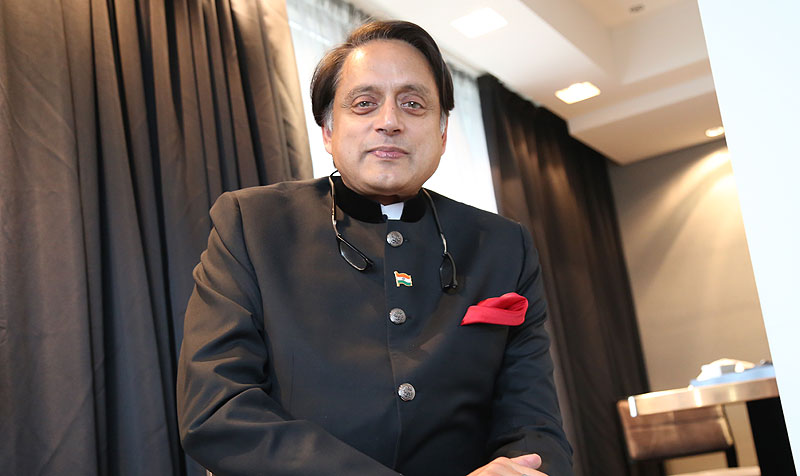
KUWAIT: In an exclusive interview with Kuwait Times yesterday, prominent Indian MP and Congress party leader Dr Shashi Tharoor said his party is now recovering from the shock it sustained in the parliamentary elections earlier this year. He added recent assembly election results from Maharashtra and Haryana states make things "more hopeful for the party" and point the way forward.
Tharoor, a former undersecretary general at the United Nations, also recalled his UN days as an international career diplomat and fondly remembered his interactions with Kuwaiti diplomats there. Tharoor arrived in Kuwait yesterday to deliver a keynote speech at the 16th anniversary of the founding of the Indian Business and Professional Council (IBPC) Kuwait at Radisson Blu Hotel.
"We were certainly stunned by the defeat and as a result we neglected to do some of the things we needed to do in the first few months, particularly in the immediate aftermath of the elections, which is a somewhat difficult thing," Tharoor replied to a question on the chaos the Congress party plunged into following the elections in India.
"I think Rahul Gandhi stepping down as Congress president actually was a bit of a surprise, because normally, political leaders in our country have a habit of saying 'these are parts of the ups and downs in democracy and we will be back next time'. So, the party was unprepared for his departure. And during that eight or nine weeks, the party was almost paralyzed and that did not do us much good," he said.
Tharoor said the best way to deal with structural flaws or problems within the party is through internal elections, as the party currently is in an anomalous position where even the so-called elected members of the working committee are nominated by the president. "But many in my party feel that this would only add to divisiveness and they prefer not to support this. At the moment, there is no sign of any proper election process taking place," he said.
Tharoor said the ruling party - the BJP - was able to sell hyper-nationalism during the parliamentary elections, but in the recent state assembly elections, voters thought much more about their daily lives. Asked if polarization is happening in India, he said it is only because the ruling party establishment wants it to happen.
"The ruling party still continues to attempt to polarize public opinion. But I would say most Indians prefer an inclusive India that celebrates diversity and truly believes in pluralism. I think that is the India the Congress party stands for. Certainly, 72 years of independence have been spent in celebrating India's inclusiveness, and to be honest, I remain a passionate voice for that because that is the India I value. I want to fight for that India within the Indian political space," Tharoor told Kuwait Times.
Asked about his interactions with Kuwaiti diplomats during his long tenure at the UN, Tharoor said Kuwaiti diplomats are very professional, extremely hardworking and great at people skills. "One of the things you need in international diplomacy is the ability to get along with people with various kinds of beliefs and points of view. And I must say that the Kuwaiti ambassador, for example, during the notorious time of the Iraqi invasion, was very skillful in working with all other ambassadors to get united condemnation and support for his country. I would say that Kuwait has had a succession of skillful diplomats and able people and whenever Kuwaiti diplomacy gets a chance to prove its worth, it does so very well. This is one of the reasons that Kuwait has no enemies around the world and has only friends," he said.
A voracious writer, Tharoor has authored 18 bestselling works, both fiction and non-fiction, since 1981. He recently completed a new book with coauthor Samir Saran. "I rarely write books with other authors. This one was partially because it has been a hectic year with elections and all that. The book is called 'The New World Disorder and the Indian Imperative', and it is about how the world has been organized and run since the Second World War," he said.
"The fact is that old governance models are no longer working and there are some real issues about allowing old systems to continue. We need to have a new approach including one in which India would play a bigger role. The book is coming out in January and we are looking forward to sharing it with readers in this part of the world as well, because you have been in many ways victims of the global governance model as well as beneficiaries of it," Tharoor pointed out.
Asked about his fascination of using obscure words like 'floccinaucinihilipilification', he said "it has become somewhat of a joke these days". "It is not a good thing as language is meant to communicate ideas, and if a certain choice of words contributes to unintelligibility, it's not doing the job. Growing up in an intellectual climate without the intrusion of mobile phones and new media, playing with words was something we did in college purely for intellectual curiosity. I have always sought out books for both entertainment and escape and these vocabulary influences come not through studying the dictionary but through extensive reading," he concluded.
By Sajeev K Peter










